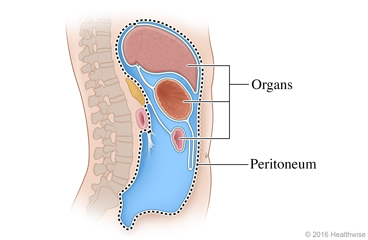What is peritonitis?
Peritonitis is an infection of the lining of the belly (peritoneum). It causes pain and swelling inside the belly. It may also cause a fever.
It can be the result of medical problems in the belly, such as a burst appendix. It can also be the result of surgery or an injury in the belly. This can lead to an infection that is caused by bacteria.
This infection is serious. It needs medical care right away. If the illness is not treated, it gets worse fast and can become life-threatening.
What are the signs?
Symptoms of peritonitis include:
- Swelling of the belly, which may feel hard (rigid).
- Severe pain and tenderness in the belly that may get worse when you move, cough, or press on the belly. The pain sometimes goes up into the shoulder.
- Fever and chills.
- A fast pulse.
- Rapid breathing.
- Confusion or feeling less alert.
- Nausea and vomiting.
- Diarrhea.
How is it treated?
Peritonitis will be treated with antibiotics. If there is fluid in your belly, your doctor may do a procedure called paracentesis (say "pair-uh-sen-TEE-sus") to get a sample of the fluid. The fluid can be tested to help your doctor decide which antibiotics will work best to treat the infection. The test can also help find the cause of your symptoms.
You may have a CT (computed tomography) scan or other imaging test. This can help find out if there is damage to an organ in the belly. If so, then you will likely need surgery to repair the damage. If your symptoms are severe, you may need surgery right away.
Follow-up care is a key part of your treatment and safety. Be sure to make and go to all appointments, and call your doctor if you are having problems. It's also a good idea to know your test results and keep a list of the medicines you take.
Current as of: October 19, 2024


